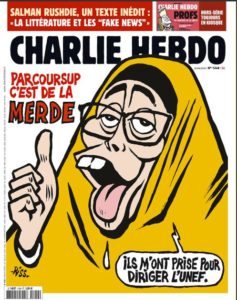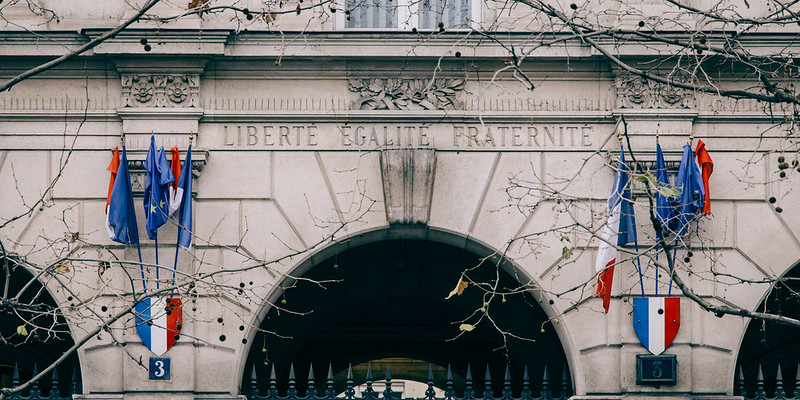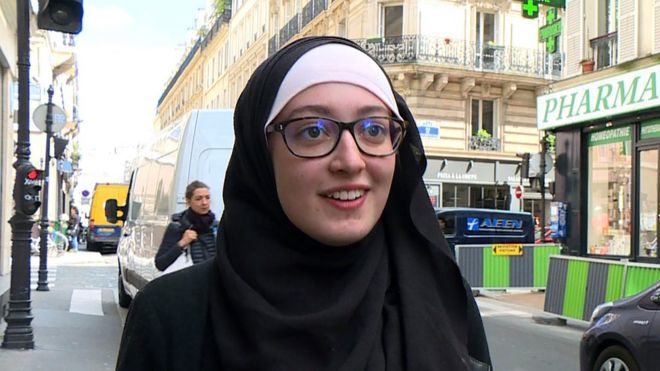Alfonso Casani – FUNCI
Last week (September 17th), the debate on the hijab or Islamic veil opened once again in France. The hijab has been one the most controversial topics of the last decade, a recurrent issue that show the difficulties found by political leaders and the French legal system to find a solution that satisfies the whole of society. The debate and its arguments comprise different approaches, from feminism to laicism, but also racism and Islamophobia, and the survival of a colonial approach to the female Muslim body and the place Islam holds in France. At the heart of the debate we find the French society’s inability to adapt to an increasingly multicultural society.
The recent controversy began when MP Anne-Christine Lang, member of the political party La Republique en Marche, led by the country’s President Emmanuel Macron, left a parliamentary commission at the French National Assembly in protest for the participation of a student wearing a hijab. The action was supported by several of her colleagues, who also condemned the clothes worn by the young student taking the floor. She was Maryam Pougetoux, current spokeswoman of the student national union UNEF, who was participating in a commission in charge of evaluating the impact of the Covid19 crisis on youth. The commission didn’t focus on Islam or the role of religion in France, however, for these deputies, the mere participation of this young Muslim represented an attack to the laicism that defines the country and its institutions.
En tant que députée et féministe, attachée aux valeurs républicaine,à la #laicite et aux #droitsdesfemmes, je ne peux accepter qu’une personne vienne participer à nos travaux à l’#AN en hijab, qui reste pour moi une marque de soumission.
J’ai donc quitté cette audition #DirectAN pic.twitter.com/6L5PRF2YvX— Anne-Christine Lang (@AChristine_Lang) September 17, 2020
“As an MP and a feminist, who values republican principles, secular principles and women’s rights, I cannot accept that someone comes to participate in our work at the National Assembly wearing a hijab, which remains for me, a symbol of submission”, explained Lang on Twitter. And, thus, laicism and feminism become a means to attack Muslim women, a tool to feed gender Islamophobia.
 Sadly, it has become something frequent in France. In fact, it is not the first time that Maryam Pougetoux finds herself in the midst of the debate. In 2018, this student was widely criticized after being elected as the UNEF’s spokesperson and participating in an interview on national TV. At the time, Marlène Schiappa, State Secretary for Equality, condemned that the Union had elected someone wearing a hijab, and the satirical magazine Charlie Hebdo devoted her its front page, with a drawing widely considered racist for portraying her with monkey-like features.
Sadly, it has become something frequent in France. In fact, it is not the first time that Maryam Pougetoux finds herself in the midst of the debate. In 2018, this student was widely criticized after being elected as the UNEF’s spokesperson and participating in an interview on national TV. At the time, Marlène Schiappa, State Secretary for Equality, condemned that the Union had elected someone wearing a hijab, and the satirical magazine Charlie Hebdo devoted her its front page, with a drawing widely considered racist for portraying her with monkey-like features.
Laicism at the heart of the debate
At the heart of the conflict we find the role played by laicism in France. In addition to its legal recognition, laicism has been a significant part of French identity since the proclamation the first Republic in the 18th century. It is recognized in article 1 of the current Constitution, as it is recognized the obligation to suppress all religious symbols from public spaces.
But this doesn’t even affect the case at hand. The National Assembly doesn’t allow pubic workers to wear religious symbols on its premises, but its regulations don’t extend to the clothes of those occasionally invited to participate. Anne-Chsitine Lang’s statement were, thus, strictly political.
What we are actually witnessing is a confrontation between laicism and communitarism, between positive and negative liberties.
So, what do we find underneath all this? What we are actually witnessing is a confrontation between laicism and communitarism, between positive and negative liberties, as defined by political scholar Isaiah Berlin more than half a century ago. This understanding offers two approaches to laicism: on the one hand, a negative approach, understood in the sense of the absolute prohibition and absence of religious symbols, which guarantees the equality of citizens through the suppression of all identity expressions. Against it we find a positive laicism, that promotes the equality of citizens by allowing the expression of all religious practices and symbols. The current controversy in France is due to the existing tension between a negative approach to laicism and a society increasingly multicultural, whose identity expressions don’t fit within the French normative values.
The reification of the women’s body
A second issue is that of Muslim women, who hold a special place on the debate on religion due to their use of clothing easily identified with Islam. In a recent report published by the European Network against Racism (ENAR), the Collective against Islamophobia in France (CCIF) explained that an 81.5% of Islamophobic attacks in France targeted Muslim women. They were also the most discriminated when accessing or maintain a job. Furthermore, according to a study published by researcher Pascal Tessemat (University of Lorraine), their chances to be hired were seven times lower when they wore a hijab.
But women aren’t only affected by Islamophobia, the actions and arguments carried out on their behalf also contribute to deprive them from their voices and agency. How can we accuse women of being submitted while speaking on their behalf?
As stated by writer Leïla Slimani in this brilliant intervention: “One can reject the hijab, I understand that, everyone is entitled to their own opinion. But there is a big difference between being against the hijab and attacking the women who wear it. Because doing so puts you at the same level of those who attack women for not wearing it, by calling them prostitutes. It is a reification of women, and reduces them to what they are wearing or not on their heads”.
The need for new practices
We need to replace this understanding with a positive approach to laicism and multiculturalism, in which Islam is a constitutive element of French society.
The debate surrounding the hijab entails many dangers, the main one, the legitimation of discriminatory practices against Muslim women, understood as submissive beings that cannot stand for themselves. This then leads to general Islamophobia (as, if we attack women for being submissive, then why not attack men for oppressing them?). In recent years, this debate has intensified through the increase of international terrorist attacks on French soil and the establishment of discriminatory connections between Islam and terrorism, which promotes an understanding of Islam as the antithesis of French values.
We need to replace this understanding with a positive approach to laicism and multiculturalism, in which Islam is a constitutive element of French society (Muslims are an 8% of the country’s population). A society where the public space and constitutive values of the Republic are respected without criminalizing religious expressions or legitimating the attack to those wearing religious symbols.

















No Comments